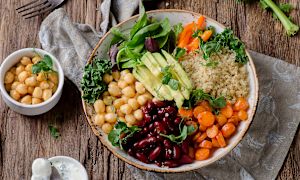Advertisement
Most egg substitute products are made from pasteurized egg whites. When you remove the yolks, you remove the cholesterol and fat, but you also lose the unique array of important vitamins, minerals, and other nutrients found in egg yolks -- such as omega-3 fats, heart-healthy monounsaturated fats, vitamin D and calcium, among many others. The food manufacturer does add back some of the nutrients that are lost when the yolk is removed, but not all.
For people on a strict low-fat diet, egg substitutes can serve as a healthy alternative, but the cost is higher than for fresh eggs. Another option is to simply use the whites from fresh eggs. The egg whites can be easily separated from the yolks by hand or with an inexpensive egg separator. One cup egg substitute is equivalent to about 4 large whole eggs or 8 egg whites.
For people on a strict low-fat diet, egg substitutes can serve as a healthy alternative, but the cost is higher than for fresh eggs. Another option is to simply use the whites from fresh eggs. The egg whites can be easily separated from the yolks by hand or with an inexpensive egg separator. One cup egg substitute is equivalent to about 4 large whole eggs or 8 egg whites.
Continue Learning about Diabetes
Important: This content reflects information from various individuals and organizations and may offer alternative or opposing points of view. It should not be used for medical advice, diagnosis or treatment. As always, you should consult with your healthcare provider about your specific health needs.




